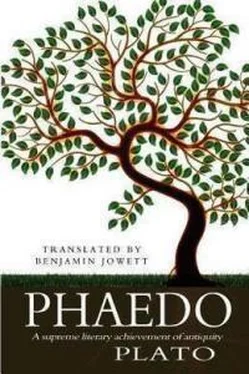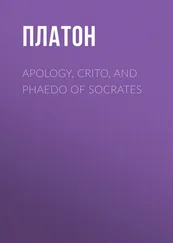Платон - Phaedo
Здесь есть возможность читать онлайн «Платон - Phaedo» весь текст электронной книги совершенно бесплатно (целиком полную версию без сокращений). В некоторых случаях можно слушать аудио, скачать через торрент в формате fb2 и присутствует краткое содержание. Год выпуска: 2014, Издательство: epubBooks Classics, Жанр: Философия, на английском языке. Описание произведения, (предисловие) а так же отзывы посетителей доступны на портале библиотеки ЛибКат.
- Название:Phaedo
- Автор:
- Издательство:epubBooks Classics
- Жанр:
- Год:2014
- ISBN:нет данных
- Рейтинг книги:3 / 5. Голосов: 1
-
Избранное:Добавить в избранное
- Отзывы:
-
Ваша оценка:
- 60
- 1
- 2
- 3
- 4
- 5
Phaedo: краткое содержание, описание и аннотация
Предлагаем к чтению аннотацию, описание, краткое содержание или предисловие (зависит от того, что написал сам автор книги «Phaedo»). Если вы не нашли необходимую информацию о книге — напишите в комментариях, мы постараемся отыскать её.
Phaedo — читать онлайн бесплатно полную книгу (весь текст) целиком
Ниже представлен текст книги, разбитый по страницам. Система сохранения места последней прочитанной страницы, позволяет с удобством читать онлайн бесплатно книгу «Phaedo», без необходимости каждый раз заново искать на чём Вы остановились. Поставьте закладку, и сможете в любой момент перейти на страницу, на которой закончили чтение.
Интервал:
Закладка:
As in several other Dialogues, there is more of system in the Phaedo than appears at first sight. The succession of arguments is based on previous philosophies; beginning with the mysteries and the Heracleitean alternation of opposites, and proceeding to the Pythagorean harmony and transmigration; making a step by the aid of Platonic reminiscence, and a further step by the help of the nous of Anaxagoras; until at last we rest in the conviction that the soul is inseparable from the ideas, and belongs to the world of the invisible and unknown. Then, as in the Gorgias or Republic, the curtain falls, and the veil of mythology descends upon the argument. After the confession of Socrates that he is an interested party, and the acknowledgment that no man of sense will think the details of his narrative true, but that something of the kind is true, we return from speculation to practice. He is himself more confident of immortality than he is of his own arguments; and the confidence which he expresses is less strong than that which his cheerfulness and composure in death inspire in us.
Difficulties of two kinds occur in the Phaedo—one kind to be explained out of contemporary philosophy, the other not admitting of an entire solution. (1) The difficulty which Socrates says that he experienced in explaining generation and corruption; the assumption of hypotheses which proceed from the less general to the more general, and are tested by their consequences; the puzzle about greater and less; the resort to the method of ideas, which to us appear only abstract terms,—these are to be explained out of the position of Socrates and Plato in the history of philosophy. They were living in a twilight between the sensible and the intellectual world, and saw no way of connecting them. They could neither explain the relation of ideas to phenomena, nor their correlation to one another. The very idea of relation or comparison was embarrassing to them. Yet in this intellectual uncertainty they had a conception of a proof from results, and of a moral truth, which remained unshaken amid the questionings of philosophy. (2) The other is a difficulty which is touched upon in the Republic as well as in the Phaedo, and is common to modern and ancient philosophy. Plato is not altogether satisfied with his safe and simple method of ideas. He wants to have proved to him by facts that all things are for the best, and that there is one mind or design which pervades them all. But this 'power of the best' he is unable to explain; and therefore takes refuge in universal ideas. And are not we at this day seeking to discover that which Socrates in a glass darkly foresaw?
Some resemblances to the Greek drama may be noted in all the Dialogues of Plato. The Phaedo is the tragedy of which Socrates is the protagonist and Simmias and Cebes the secondary performers, standing to them in the same relation as to Glaucon and Adeimantus in the Republic. No Dialogue has a greater unity of subject and feeling. Plato has certainly fulfilled the condition of Greek, or rather of all art, which requires that scenes of death and suffering should be clothed in beauty. The gathering of the friends at the commencement of the Dialogue, the dismissal of Xanthippe, whose presence would have been out of place at a philosophical discussion, but who returns again with her children to take a final farewell, the dejection of the audience at the temporary overthrow of the argument, the picture of Socrates playing with the hair of Phaedo, the final scene in which Socrates alone retains his composure—are masterpieces of art. And the chorus at the end might have interpreted the feeling of the play: 'There can no evil happen to a good man in life or death.'
'The art of concealing art' is nowhere more perfect than in those writings of Plato which describe the trial and death of Socrates. Their charm is their simplicity, which gives them verisimilitude; and yet they touch, as if incidentally, and because they were suitable to the occasion, on some of the deepest truths of philosophy. There is nothing in any tragedy, ancient or modern, nothing in poetry or history (with one exception), like the last hours of Socrates in Plato. The master could not be more fitly occupied at such a time than in discoursing of immortality; nor the disciples more divinely consoled. The arguments, taken in the spirit and not in the letter, are our arguments; and Socrates by anticipation may be even thought to refute some 'eccentric notions; current in our own age. For there are philosophers among ourselves who do not seem to understand how much stronger is the power of intelligence, or of the best, than of Atlas, or mechanical force. How far the words attributed to Socrates were actually uttered by him we forbear to ask; for no answer can be given to this question. And it is better to resign ourselves to the feeling of a great work, than to linger among critical uncertainties.
Phaedo
Persons of the Dialogue:
Phaedo, who is the narrator of the dialogue to Echecrates of Phlius. Socrates, Apollodorus, Simmias, Cebes, Crito and an Attendant of the Prison.
SCENE: The Prison of Socrates.
PLACE OF THE NARRATION: Phlius.
ECHECRATES: Were you yourself, Phaedo, in the prison with Socrates on the day when he drank the poison?
PHAEDO: Yes, Echecrates, I was.
ECHECRATES: I should so like to hear about his death. What did he say in his last hours? We were informed that he died by taking poison, but no one knew anything more; for no Phliasian ever goes to Athens now, and it is a long time since any stranger from Athens has found his way hither; so that we had no clear account.
PHAEDO: Did you not hear of the proceedings at the trial?
ECHECRATES: Yes; some one told us about the trial, and we could not understand why, having been condemned, he should have been put to death, not at the time, but long afterwards. What was the reason of this?
PHAEDO: An accident, Echecrates: the stern of the ship which the Athenians send to Delos happened to have been crowned on the day before he was tried.
ECHECRATES: What is this ship?
PHAEDO: It is the ship in which, according to Athenian tradition, Theseus went to Crete when he took with him the fourteen youths, and was the saviour of them and of himself. And they were said to have vowed to Apollo at the time, that if they were saved they would send a yearly mission to Delos. Now this custom still continues, and the whole period of the voyage to and from Delos, beginning when the priest of Apollo crowns the stern of the ship, is a holy season, during which the city is not allowed to be polluted by public executions; and when the vessel is detained by contrary winds, the time spent in going and returning is very considerable. As I was saying, the ship was crowned on the day before the trial, and this was the reason why Socrates lay in prison and was not put to death until long after he was condemned.
ECHECRATES: What was the manner of his death, Phaedo? What was said or done? And which of his friends were with him? Or did the authorities forbid them to be present—so that he had no friends near him when he died?
PHAEDO: No; there were several of them with him.
ECHECRATES: If you have nothing to do, I wish that you would tell me what passed, as exactly as you can.
PHAEDO: I have nothing at all to do, and will try to gratify your wish. To be reminded of Socrates is always the greatest delight to me, whether I speak myself or hear another speak of him.
ECHECRATES: You will have listeners who are of the same mind with you, and I hope that you will be as exact as you can.
PHAEDO: I had a singular feeling at being in his company. For I could hardly believe that I was present at the death of a friend, and therefore I did not pity him, Echecrates; he died so fearlessly, and his words and bearing were so noble and gracious, that to me he appeared blessed. I thought that in going to the other world he could not be without a divine call, and that he would be happy, if any man ever was, when he arrived there, and therefore I did not pity him as might have seemed natural at such an hour. But I had not the pleasure which I usually feel in philosophical discourse (for philosophy was the theme of which we spoke). I was pleased, but in the pleasure there was also a strange admixture of pain; for I reflected that he was soon to die, and this double feeling was shared by us all; we were laughing and weeping by turns, especially the excitable Apollodorus—you know the sort of man?
Читать дальшеИнтервал:
Закладка:
Похожие книги на «Phaedo»
Представляем Вашему вниманию похожие книги на «Phaedo» списком для выбора. Мы отобрали схожую по названию и смыслу литературу в надежде предоставить читателям больше вариантов отыскать новые, интересные, ещё непрочитанные произведения.
Обсуждение, отзывы о книге «Phaedo» и просто собственные мнения читателей. Оставьте ваши комментарии, напишите, что Вы думаете о произведении, его смысле или главных героях. Укажите что конкретно понравилось, а что нет, и почему Вы так считаете.










